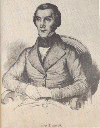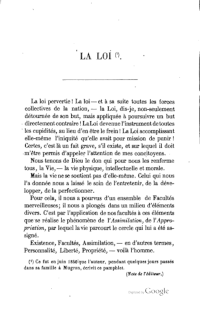
Nobel Laureate F.A. Hayek called Bastiat (1801-1850) "a publicist of genius."1 Bastiat wrote brilliant essays and satires showing why protectionism is plunder. His most famous satire is a petition by candle makers who want the government to prevent unfair competition from the sun by forcing everybody to block out sunlight.
Bastiat, who became a good friend of the English free traders Richard Cobden and John Bright, launched the free trade movement in France. The result was the historic 1860 trade liberalization agreement between France and England, countries which had fought each other for more than two hundred years. This agreement, in turn, led to trade liberalization with Austria-Hungary, German states, Italy, Norway, Portugal, Spain, Sweden and Switzerland.
Bastiat displayed extraordinary insight when he showed why socialism must lead to tyranny. Incredibly, he began publishing his critiques of socialism before Karl Marx and Friedrich Engels had written The Communist Manifesto (1848).
In his beloved little book The Law (1850) and other writings, Bastiat exposed the folly of relying on government to solve problems.
 He wrote, "The state opens a road, builds a palace, repairs a street, digs a canal; with these projects it gives jobs to certain workers. That is what is seen. But it deprives certain other laborers of employment. That is what is not seen ... do millions of francs descend miraculously on a moonbeam into the coffers of [politicians]? For the process to be complete, does not the state have to organize the collection of funds as well as their expenditure? Does it not have to get its tax collectors into the country and its taxpayers to make their contributions?"2—reprinted from the Laissez Faire Books web site.
He wrote, "The state opens a road, builds a palace, repairs a street, digs a canal; with these projects it gives jobs to certain workers. That is what is seen. But it deprives certain other laborers of employment. That is what is not seen ... do millions of francs descend miraculously on a moonbeam into the coffers of [politicians]? For the process to be complete, does not the state have to organize the collection of funds as well as their expenditure? Does it not have to get its tax collectors into the country and its taxpayers to make their contributions?"2—reprinted from the Laissez Faire Books web site.
* * *
Bastiat on Why Law and Charity Are Not the Same
The mission of the law is not to oppress persons and plunder them of their property, even though the law may be acting in a philanthropic spirit. Its mission is to protect persons and property.
Furthermore, it must not be said that the law may be philanthropic if, in the process, it refrains from oppressing persons and plundering them of their property; this would be a contradiction. The law cannot avoid having an effect upon persons and property; and if the law acts in any manner except to protect them, its actions then necessarily violate the liberty of persons and their right to own property.
The law is justice—simple and clear, precise and bounded. Every eye can see it, and every mind can grasp it; for justice is measurable, immutable, and unchangeable. Justice is neither more than this nor less than this.
If you exceed this proper limit—if you attempt to make the law religious, fraternal, equalizing, philanthropic, industrial, literary, or artistic—you will then be lost in an uncharted territory, in vagueness and uncertainty, in a forced utopia or, even worse, in a multitude of utopias, each striving to seize the law and impose it upon you. This is true because fraternity and philanthropy, unlike justice, do not have precise limits. Once started, where will you stop? And where will the law stop itself?3
Copyright © 2000, The Daily Objectivist - Reprinted with permission of The Daily Objectivist and Davidmbrown.com.
28 Nov 2008 (last edit: 10 Jan 2024)
You can assist the work of Freedom Circle by purchasing one of the works discussed above:
-
F. A. Hayek, "Introduction", in Frédéric Bastiat, Selected Essays on Political Economy, Seymour Cain (translator), George B. de Huszar (editor), Irvington-on-Hudson, New York: Foundation for Economic Education, 1995, p. ix. Publicist is meant in the older sense of "a regular writer on public affairs". (Freedom Circle note) ↩︎
-
Bastiat, "What Is Seen and What Is Not Seen: Public Works", Selected Essays, pp. 16-17. (Freedom Circle note) ↩︎
-
Frédéric Bastiat, The Law, Dean Russell (translator), Irvington-on-Hudson, New York: Foundation for Economic Education, 1950, pp. 68-69. (Freedom Circle note) ↩︎
